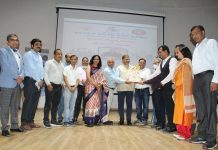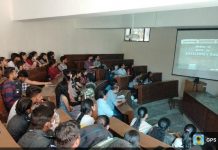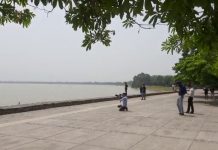SRINAGAR, OCTOBER 02: Commissioner Secretary Forest Ecology and Environment, Manoj Kumar Dwivedi, today inaugurated One-day State level Workshop cum Stakeholder Consultation on “Vulnerability of J&K Forests to Climate Change” here today.
The workshop was organised by G B Pant National Institute of Himalayan Environment & Sustainable Development (GBPIHED) in collaboration with Jammu & Kashmir State Climate Change Centre (J&K SCCC) under National Mission for Sustaining the Himalayan Ecosystem (NMSHE).
The main aim of the workshop was to share findings (assessment of impacts of climate change, vulnerability mapping and adaptation framework for forests) of the draft report among stakeholders and initiate discussions to identify incremental and transformational adaptation strategies for the state of Jammu and Kashmir.
Speaking on the occasion Dwivedi said that this consultation will create a comprehensive understanding of the forest vulnerability to climate change the State is confronting. He said that that there is a need for development, but that should be accomplished without damage to the environment. He stressed on the fact, that all the stakeholders need to come forward and work collaboratively on actionable points in a time-bound manner so that the results are visible on ground and benefits are harnessed by the common people.
He added that the there should be practical applicability of academic exercises to policy decisions and projects thereof and the stakeholder departments should consider the environmental and climatic concerns while executing any developmental projects. He stressed for making efforts more central to achieve sustainable development goals. He applauded the role of Department of Ecology, Environment and Remote Sensing from research and awareness point of view. He underscored the need for strengthening of the EERS Department.
Principal Chief Conservator Forests Suresh Chugh while addressing the gathering informed the audience about the efforts that have gone into making the State Action Plan on Climate Change. He stressed that lack of preparation of Project Concept Notes / DPRS by line departments has been impediment in exploring the funding opportunities at National and International Level. He added that the pace of the departmental activities doesn’t match with required actions to attract funding for the agencies. He underlined the indicators of climate change in terms of snowline shifting, early fruit ripening and floods of September 2014 as a warning and essence of possible impacts of climate change.
Chief Wildlife Warden and head of Forest Force, Ravi Kesar said that the importance of Himalayan States with respect to the climate change has already been recognized at national and international levels. He informed that uncontrolled and unmanaged grazing is an issue and is taking a heavy toll of alpine grasslands. He stressed upon focussed research on species that are more climate resilient and can withstand drought conditions. He further added that the State is deficient in research with respect to impacts of climate change on endangered/vulnerable wildlife species and needs to be addressed.
Director Ecology, Environment and Remote Sensing Om Prakash Sharma stressed upon the measures and steps that need to be taken per se from adaptation and mitigation point of view. He said that prescriptions are known but actions are delayed. He added that forests are drying in some areas and forest regeneration is failing probably due to the impacts of climate change. He said that consultation with civil society members should be done regularly to get an essence of community perception.
The Director SFRI N. P. Singh, Director of Social Forestry, S K Gupta, Coordinator CAMPA, Sarvesh Rai, CCF (Kashmir) Farooq Gillani were also present on the occasion. Besides DFOs (Demarcation, Planning & Publicity, ICT, and Statistics) and Project Coordinator, WUCMA were also present during deliberations.
Earlier Majid Farooq, State Coordinator Climate Change Centre presented a detailed overview of Climate Change and Vulnerability assessment of Jammu and Kashmir showing significant increase in mean minimum, maximum and diurnal temperatures, vanishing wetlands, melting glaciers, reducing discharge of rivers of state and also the erratic behaviour of precipitation as indicators of climate variability. The district wise vulnerability ranking was also shared.
The outcomes of first ever climate resilient sustainable agriculture project being implemented in Budgam and Jammu blocks was also highlighted. The need to revise the State Action Plan on Climate Change was underlined. He also informed that one more adaptation project on Springshed Management has also been prepared for submission to NAFCC for funding.
Later, Dr Subrat Sharma, GBPIHED presented the findings (assessment of impacts of climate change, vulnerability mapping and adaptation framework for forest of J&K) among stakeholders and detailed deliberations and discussions were held to make the outcomes more distilled and meaningful for recommendations at national level and later for India’s Third National Communication to UNFCC.
Ex-PCCF, G H Kangoo and wildlife expert M Shafi Bacha were also part of the workshop and shared their vast experience and wisdom with the forum. Representatives from Faculty of Forestry, SKUAST-K & SKUAST-J, Botany Department, University of Kashmir and Jammu, Members of Civil Society (Nazir Benazir, Raja Muzaffar Bhat, Dr Rafi) and Nadeem Qadri (Amicus Curiae) Hon’ble High Court J&K also participated in the discussions.









































